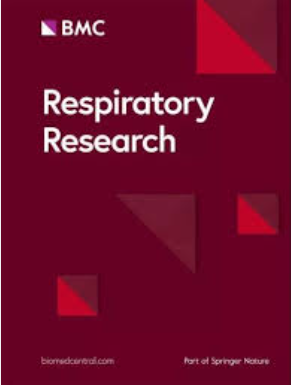Psoriasis may increase the risk of idiopathic pulmonary fibrosis: a two-sample Mendelian randomization study
IF 4.7
2区 医学
Q1 RESPIRATORY SYSTEM
引用次数: 0
Abstract
Although some studies have indicated that Psoriasis could contribute to the risk of idiopathic pulmonary fibrosis (IPF), no study has reported a clear causal association between them. Our aim was to explore the potential relationship between Psoriasis and IPF using Mendelian randomization (MR) design. To explore a causal association between Psoriasis and IPF, we used genetic instruments from the largest available genome-wide association study (GWAS) of European ancestry, including psoriasis (5314 cases, 457,619 controls) and IPF (1028 cases, 196,986 controls). Our main analyses were conducted by inverse-variance weighted (IVW) method with random-effects model, with the other complementary four analyses: weighted median method, weighted mode, multivariable MR and MR-Egger approach. The results of IVW methods demonstrated that genetically predicted psoriasis was significantly associated with higher odds of IPF, with an odds ratio (OR) of 1.09 (95%CI, 1.01–1.18; P = 0.02). Weighted median method, weighted mode and multivariable MR also demonstrated directionally similar results (P < 0.05), while the MR-Egger regression did not reveal the impact of psoriasis on IPF (OR = 1.09, 95%CI, 0.98–1.21; P = 0.11). In addition, both funnel plots and MR-Egger intercepts indicated no directional pleiotropic effects between psoriasis and IPF. Our study provided potential evidence between genetically predicted psoriasis and IPF, which suggests that understanding the mutual risk factors between psoriasis and IPF can facilitate the clinical management of both diseases.银屑病可能增加特发性肺纤维化的风险:一项双样本孟德尔随机研究
尽管一些研究表明,银屑病可能会增加特发性肺纤维化(IPF)的发病风险,但还没有研究报告表明二者之间存在明确的因果关系。我们的目的是采用孟德尔随机化(MR)设计,探讨银屑病与特发性肺纤维化之间的潜在关系。为了探讨银屑病与 IPF 之间的因果关系,我们使用了现有最大的欧洲血统全基因组关联研究(GWAS)中的遗传工具,包括银屑病(5314 例,457619 例对照)和 IPF(1028 例,196986 例对照)。我们的主要分析方法是采用随机效应模型的逆方差加权(IVW)法,以及其他四种补充分析方法:加权中值法、加权模式、多变量 MR 和 MR-Egger 法。IVW 方法的结果表明,遗传预测的银屑病与较高的 IPF 发生几率显著相关,其几率比(OR)为 1.09(95%CI,1.01-1.18;P = 0.02)。加权中值法、加权模式和多变量 MR 也显示出方向相似的结果(P < 0.05),而 MR-Egger 回归则没有显示出银屑病对 IPF 的影响(OR = 1.09,95%CI,0.98-1.21;P = 0.11)。此外,漏斗图和 MR-Egger 截距均表明银屑病与 IPF 之间不存在方向性多效应。我们的研究提供了银屑病和 IPF 基因预测之间的潜在证据,这表明了解银屑病和 IPF 之间的相互风险因素有助于这两种疾病的临床治疗。
本文章由计算机程序翻译,如有差异,请以英文原文为准。
求助全文
约1分钟内获得全文
求助全文
来源期刊

Respiratory Research
医学-呼吸系统
自引率
1.70%
发文量
314
期刊介绍:
Respiratory Research publishes high-quality clinical and basic research, review and commentary articles on all aspects of respiratory medicine and related diseases.
As the leading fully open access journal in the field, Respiratory Research provides an essential resource for pulmonologists, allergists, immunologists and other physicians, researchers, healthcare workers and medical students with worldwide dissemination of articles resulting in high visibility and generating international discussion.
Topics of specific interest include asthma, chronic obstructive pulmonary disease, cystic fibrosis, genetics, infectious diseases, interstitial lung diseases, lung development, lung tumors, occupational and environmental factors, pulmonary circulation, pulmonary pharmacology and therapeutics, respiratory immunology, respiratory physiology, and sleep-related respiratory problems.
 求助内容:
求助内容: 应助结果提醒方式:
应助结果提醒方式:


